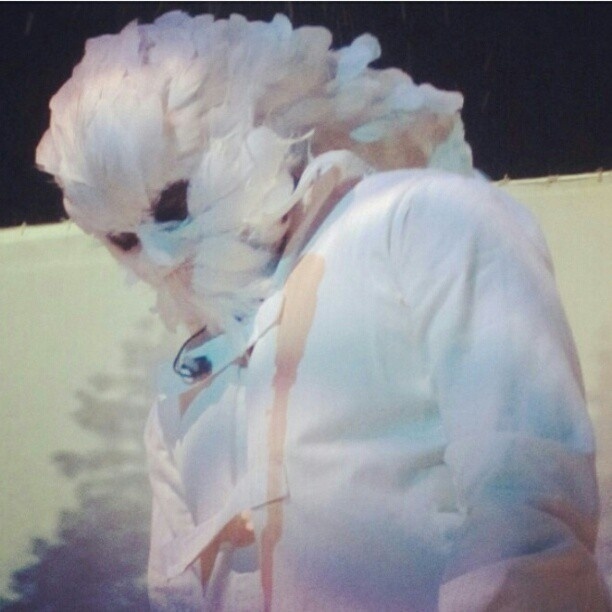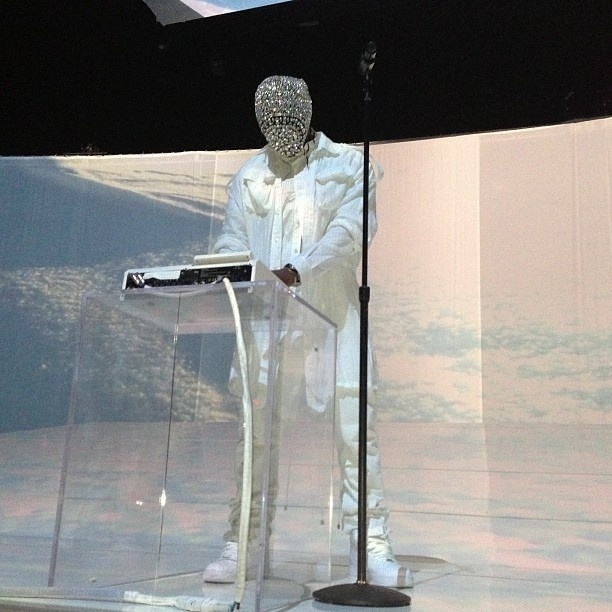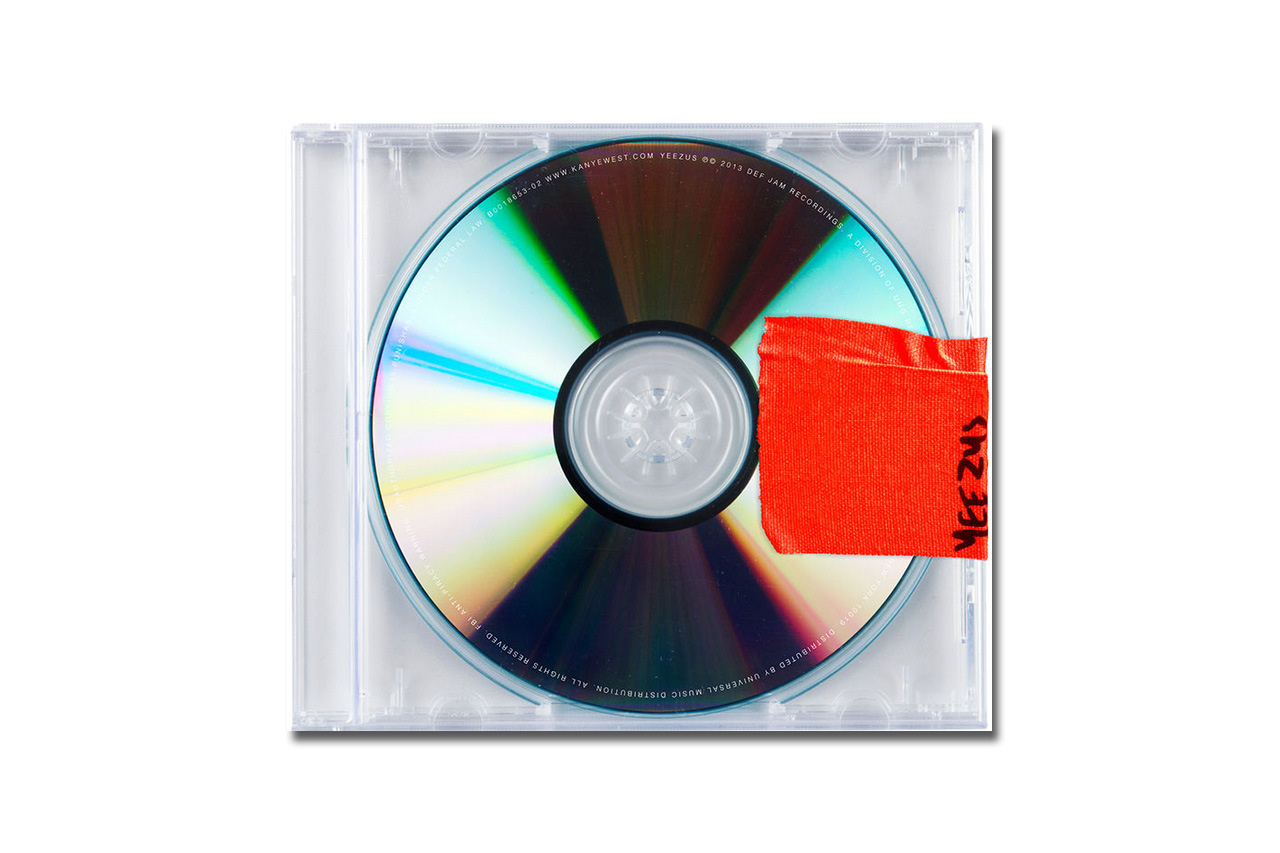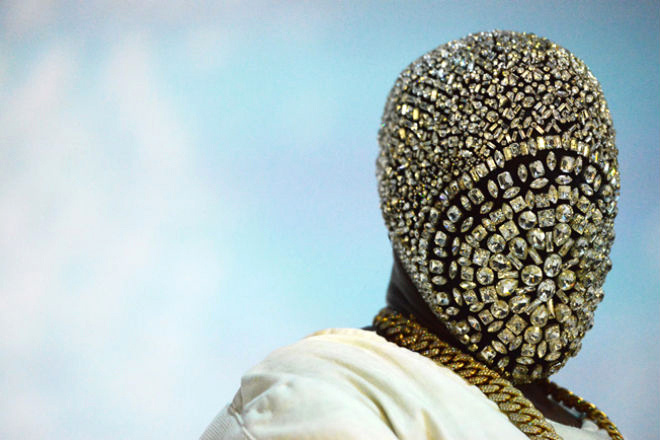Kanye West’s sixth solo album, Yeezus, leaked on Friday afternoon, turning even the most touristic of hip-hop heads into rubberneckers, all clamouring for a glimpse of the next chapter in Kanye’s megalomaniacal masterpiece.
Hasty critics will have cemented their opinion after the first listen, with the over-expectant imploring the return of old Kanye – a ridiculous proposition considering he’s been a different man on every record – while the shackled Stans will no doubt label Yeezus as the G.O.A.T., regardless of its substance.
Videos by VICE
While the thirst for a new Yeezy record needs no explanation – it’s his first solo record since the 10.0 scoring career opus of My Beautiful Dark Twisted Fantasy; Watch The Throne and Cruel Summer providing mere stopgaps – it’s the content of Yeezus that deserves a comprehensive disection.
The past few months have been chaotic for Kanye. At the start of 2013 he started performing in various costumes, and would go through lengthy on-stage rants, taking down everyone from the Grammys to Justin Timberlake. Several of the rants concluded in vicious screaming and bouts of rage. In March, Kanye called in to Hot 97 to argue the ordering of MTV’s Hottest MCs list, while elsewhere, news bounded around regarding plans to call his now newborn-child “North West” and his new record I Am A God. Last month Kanye walked into a sign. Basically, returning to the rap game with an album called “Yeezus” was the lethal injection to Kanye’s new found insanity. But, there’s much more to it than that. Because, if you don’t believe that this is the most calculated project that Kanye has ever put out, then you’re vastly underestimating one of the highest-earning Grammy musicians OF ALL TIME.
Including his Freshman Adjustment series, Kanye’s story starts with self-consciousness and excessive materialism. His first two records, College Dropout and Late Registration, dealt with themes of family issues, financial gain, and on his skits, an encapsulation of a contradiction at the core of contemporary society, in that success is led not in the need to fit in, but in a Darwinist grab for materialistic matter. Graduation, with its power trio of singles “Flashing Lights”, “Homecoming” and “Good Life” felt empowering, but the record had elements of sadness at being at the top intertwined. 808s and Heartbreak, released after the death of his mother, focused on themes of love, loss and separation. My Beautiful Dark Twisted Fantasy reigned in the themes of all the previous records and combined them with unimaginable decadence, while Watch The Throne, Kanye’s collaborative album with Jay Z, focused on issues of race relations and black empowerment. Phew.
While each record has its own individual theme, they all have an overarching theme of race and class relation. In terms of Kanye’s discography, an anti-establishment persona seems to fit with where he’s at in his career now. Alongside this, early in 2012, Kanye announced the launch of his new initiative DONDA, a company that aimed to take what Michael Jackson felt, combine it with the legacy left behind by Steve Jobs and Alexander McQueen, and create a new way of thinking.
So, if Kanye is at the point in his career where he is renowned enough to be a figurehead for the anti-media rhetoric that he’s been battling through since the beginning, and he has announced the launch of his DONDA campaign, an anti-authoritarian initiative, could the two be combined? Let’s take a look.
THE CAST OF CHARACTERS
In Spring, while playing a smidgen of small club shows across Europe, Kanye performed in two different costumes.
Here’s the first.

Yeah, it looks like a bastardised version of Hedwig. But the outfit also seems to represent a tamed animal, tying in with the sparse serenity of the 808s and Heartbreak tracks that he performs while wearing this. While performing, Kanye also stands non-confrontational, with his arms crossed.
On Yeezus, there’s a clear distinction between the heavily auto-tuned tracks (“Blood On The Leaves”) and the confrontational, protest tracks (“New Slaves”, “Black Skinhead”). Kanye has already said that “West” is his slave name, which links in with the bluntness of the latter tracks, and he’s also said that “Yeezus” is his God name. Could this tamed animal, not dissimilar to historical depictions of deities, represent the God-like side to Kanye?
The biggest clue here is the “God” featuring “I Am A God”, which ends with high pitched distressing screams. Although we haven’t seen a proper video of Kanye performing the song yet, could the sounds be made by Yeezus? Is he being tortured by corporate America? Is he killing off the slave name of “West”?
More on that later. The second costume is this jewel encrusted mad scientist mask.

It looks like something from a bad nightmare. But it’s also this costume that I can imagine Kanye wearing while performing the acid-house tinged track “On Sight” and the trap-leaning “I’m In It”.
What’s all this fancy dress got to do with Yeezus? On the record, there are the throwback sounds of “Bound 2”, which sounds like the most OG Kanye song since last year’s “White Dress”. It’s almost a celebratory track for the end of the record. However, the contrast between this, and say, “New Slaves” is like the difference between a protest rally and an episode of Soul Train. While, again, there’s a further difference between “New Slaves” and say, “On Site”.
It’s clear that Kanye is playing about with multi-character story telling. With that in mind, I’d like to believe that the record exists in two formats, with Yeezus – Kanye in his purest format – the self-appointed “slave” taking on duties on the record’s rawest of tracks, while Kanye’s owl and discohead alter-egos take the reins on others.
The “slave” character, in my opinion, represents everything that Kanye has always stood for throughout the majority of his career, but put into overdrive. The discohead character represents Kanye’s new-found psychotic acid-house tinged sound, while the God-like owl character represents the melancholic, emotional sounds of Kanye.
Also, as a last point, before Yeezus was announced, an initial name floating around was Black American Pyscho, which certainly seems to fit into the idea that after the sterile, asylum-sounding Cruel Summer, Kanye went off the rails, bounding about with split personalities, represented by the performances of strait-jacket wearing costumes versus plain-faced pink-polo-wearing Yeezy. Although the initial name was dropped, Kanye screened a film at the weekend that certainly fits into the psycho theory.
YEEZUS
The whole nature of Yeezus has been anti-corporate since the very beginning. It’s almost as if Kanye ditched the notion of conventionally selling records, opting instead for a marketing campaign with a message. In the lead up to Yeezus there were no pre-orders, no CD quality teaser singles, and no self-masturbatory “I’m Ready” teaser videos. Instead, in the most hands-on approach since UK grime MCs realised they could shot mixtapes outside the Stratford Centre, Kanye decided to project his music on to buildings in 66 different cities. It didn’t matter if you didn’t want to hear it, Kanye took over your town like a dictator.
Yeezy has said in the past: “just as Mandela blew up buildings and eventually became president… contrary to popular opinion, sometimes you have to blow up the building.” The reference to Mandela here is key. Not because Kanye is a South African freedom fighter, but because the ideology of a revolutionary is the dominant theme of the record. As pointed out by Noisey before, both “New Slaves” and “Black Skinhead” touch upon racial issues, just as every Kanye West record has dealt with issues of race. Instead, with Yeezus, there’s much more of a commandeering message – “because there’s leaders and there’s followers / but I’d rather be a dick than a swallower” – suggesting that Kanye would rather be a jerk and get criticised for it, than swallow his own words.
At the record’s listening party, Kanye again stated that Yeezus was a reference to both his “slave name” and his “God” name. On “New Slaves” he says, “You see it’s broke nigga racism, that’s that ‘Don’t touch anything in the store’ / And this rich nigga racism, that’s that ‘Come in, please buy more / What you want, a Bentley? Fur coat? A diamond chain? All you blacks want all the same things”. It’s a layered commentary, remarking on the enslavement of the black rich to commodities, the transposition of racialised sterotypes from of poor African Americans to the wealthy class, and the absurdity of a prejudice of black people only seeking wealth, when the shackles of economic slavery still handicap black America. The perspective of this record isn’t one you’ve heard before, instead of hip-hop in the ghetto tackling issues of race, it’s a meglomaniac in the 1% of the 1%.
It would be mistaken, however, to suggest that this record is simply a vehicle for racial protest. On “Blood On The Leaves”, Kanye samples Billie Holiday’s “Strange Fruit”, perhaps the most racially charged song of all time. Written by Abel Meeropl, a Communist party member, as a protest against lynchings, it’s horrifying reveal, of “black bodies swining in the Southern breeze”, led Time magazine to call it the Song of the Century. So what does Kanye do with it? A powerful, political piece about how far America has come, and how far it still has to go? Err…
“Let’s take it back to the first party
When you tried your first molly
And came out of your body
Running naked down the lobby”
This is less a record about struggle as it is about subversion. Whether that’s stereotypes about hip-hop, race or Kanye himself, he finds a way to undermine and exceed expectations at the same time. Kanye is representing a minority, whether that be black, white or poor people, and fighting with them against concreted hierarchy. While wielding numchucks and screaming like a maniac. But, while he’s doing it because it’s how he feels, does he also have a higher plain of thinking surrounding the record?
This is where the marketing for the record comes into place.
DONDA

Instead of decorating his record, or its pre-release, with lavish, lustful artwork or promos, Kanye has released Yeezus as just a jewel case CD. This is for a reason. It lets the music speak for itself, without pre-judged ideals based on aesthetics or presentation.
This approach runs through to the music, too. Upon first listen, especially when placed against MBDTF, the record can sound rushed, or unfinished. But, this approach is intentional, with Rick Rubin being brought in to make the tracks have that minimalist pop, accentuating the rawness of the message.
The minimal aesthetics of his marketing campaign – which runs through to the release of label-mate Pusha T’s “Numbers On The Boards” – represents the signs of DONDA’s cross pollinating movement. It’s a movement that is free from the restraints of corporate America, a country that likes to suggest that it’s liberal in its entirety, despite still being concreted in year-old ideals. When announcing the DONDA launch, Kanye said that it would follow in the footsteps of Steve Jobs. Without being blasé, if Steve is the God of the computing world, and if Yeezus is Kanye’s “God” name, then he’s essentially presenting himself, and his company, as powerful, iconic leaders of a new movement.
But, if the anti-authoritarian Kanye has combined with the anti-authoritarian movement of DONDA, where does this leave the multi-faceted character storytelling?
Yeezus is as much of an assimilation of Kanye’s journey so far, as it is both an anti-authoritarian record and mission statement for the future of DONDA. Yeezus represents a newfound voice of creativity within America.
Follow Ryan on Twitter @RyanBassil
Read more about Kanye West and conspiracy theories here:
The Conspiracy Theorist’s Guide to Tyler, The Creator’s Wolf
More
From VICE
-

Denise Truscello/WireImage/Getty Images -

A stack of modular Mesh Home Batteries – Credit: Pila Energy -

Gemini on a smartphone – Photo Illustration by Thomas Fuller/SOPA Images/LightRocket via Getty Images -

(Photo by Shirlaine Forrest / WireImage via Getty Images)
